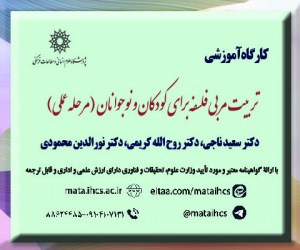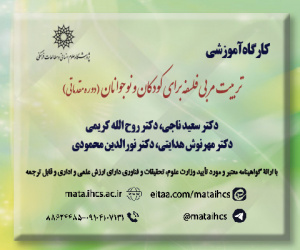جستاری پراگماتیستی در کتاب انیس الناس به عنوان نماینده آموزش ایران در دوران تیموری
آرشیو
چکیده
آموزش به عنوان بخش مهمی از زندگی انسان چه در زمان حال و چه در طول تاریخ همواره مورد توجه پژوهشگران بوده است. در حال حاضر نظریات و مکاتب فلسفی آموزشی متفاوتی زیربنای نظام های آموزشی کشورهای مختلف در جهان را فراهم می کند. در تاریخ ایران نیز نویسندگان مختلفی در کتاب های گوناگون به مبحث آموزش کودکان پرداخته اند و نظرات عملی خود را در این باب به نگارش درآورده اند. در کتاب های قدیمی، آموزش بر سه اصل بنا بود که این اصول عبارت بود از محفوظات، تکرار و تنبیه. با این حال مهم ترین پرسش هایی که در این زمینه مطرح می شود عبارت از این است که ریشه های این اصول کدام است؟ منابع اصلی آنها چیست؟ و اینکه این اصول از منظر نظریه های جدید به خصوص در رابطه با مکتب پراگماتیسم (عمل گرایی) چگونه ارزشیابی می شود. هدف این پژوهش بررسی کتاب انیس الناس به عنوان یکی از کتاب های نماینده این طرز تفکر در دوران تیموری با استفاده از روش توصیفی و کتابخانه ای است.A Pragmatic Study of Anīs al-nās as the Representative of Iranian Educational System during the Timurid Empire
As an important part of human life, education has always attracted the attention of researchers. Presently, different educational philosophies and theories provide the foundation for the educational systems of various countries in the world. Similarly, different authors have discussed the issue of children’s education in numerous books in the course of history and offered their practical views in this regard. Most educational books in the past emphasized that education could be accomplished based on three principles: memorization, repetition, and punishment. However, the most important questions here are what the roots of these principles are, what the main sources supporting these principles are, and how this approach to education is evaluated based on modern educational theories, particularly from the viewpoint of pragmatism. Accordingly, following a descriptive-library method, this study was conducted to explore the book of Anīs al-nās, as one of the representatives of this approach during the Timurid Period.



